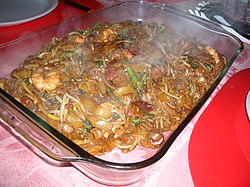Char kway teow
 |
|
| Type | Shahe fen |
|---|---|
| Place of origin | Malaysia and Singapore |
| Region or state | Southeast Asia |
| Main ingredients | Shahe fen, light and dark soy sauce, chilli, belachan, whole prawns, deshelled blood cockles, bean sprouts, Chinese chives |
| |
|
| Char kway teow | |||||||||||||||
| Traditional Chinese | 炒粿條 | ||||||||||||||
|---|---|---|---|---|---|---|---|---|---|---|---|---|---|---|---|
| Simplified Chinese | 炒粿条 | ||||||||||||||
| Literal meaning | stir-fry ricecake strips (i.e. stir-fried ricecake strips) | ||||||||||||||
|
|||||||||||||||
| Alternative name in Cantonese-speaking regions |
|||||||||||||||
| Traditional Chinese | 炒貴刁 | ||||||||||||||
| Simplified Chinese | 炒贵刁 | ||||||||||||||
| Literal meaning | transcription from the original name in Hokkien (Min Nan) | ||||||||||||||
|
|||||||||||||||
| Transcriptions | |
|---|---|
| Standard Mandarin | |
| Hanyu Pinyin | chǎo guǒ tiáo |
| Yue: Cantonese | |
| Jyutping | caau2 gwo2 tiu4 |
| Southern Min | |
| Hokkien POJ | chhá-kóe-tiâu |
| Transcriptions | |
|---|---|
| Standard Mandarin | |
| Hanyu Pinyin | cháo guì diāo |
| Yue: Cantonese | |
| Jyutping | caau2 gwai3 diu1 |
Char kway teow, literally "stir-fried ricecake strips", is a popular noodle dish in Malaysia, Singapore, Brunei and Indonesia. The dish is considered a national favourite in Malaysia and Singapore.
It is made from flat rice noodles (河粉 hé fěn in Chinese) or kway teow (粿条 guǒ tiáo in Chinese) of approximately 1 cm or (in the north of Malaysia) about 0.5 cm in width, stir-fried over very high heat with light and dark soy sauce, chilli, a small quantity of belachan, whole prawns, deshelled blood cockles, bean sprouts and chopped Chinese chives. The dish is commonly stir-fried with egg, slices of Chinese sausage, fishcake, beansprouts, and less commonly with other ingredients.Char kway teow is traditionally stir-fried in pork fat, with crisp croutons of pork lard. In Penang, Char kway teow is commonly served on a piece of banana leaf on a plate, so as to enhance the aroma on the noodles.
Char kway teow has a reputation of being unhealthy due to its high saturated fat content. However, when the dish was first invented, it was mainly served to labourers. The high fat content and low cost of the dish made it attractive to these people as it was a cheap source of energy and nutrients. When the dish was first served, it was often sold by fishermen, farmers and cockle-gatherers who doubled as char kway teow hawkers in the evening to supplement their income.
The term "char kway teow" is a transliteration of the Chinese characters 炒粿條 (in simplified Chinese 炒粿条),Teochew origin and also pronounced chhá-kóe-tiâu? in Min Nan (also known as Teochew or Hokkien). The word kóe-tiâu (literally meaning "ricecake strips") generally refers to flat rice noodles, which are the usual ingredient in West Malaysia and Singapore. In East Malaysia, on the other hand, actual sliced ricecake strips are used to make this dish.
...
Wikipedia
